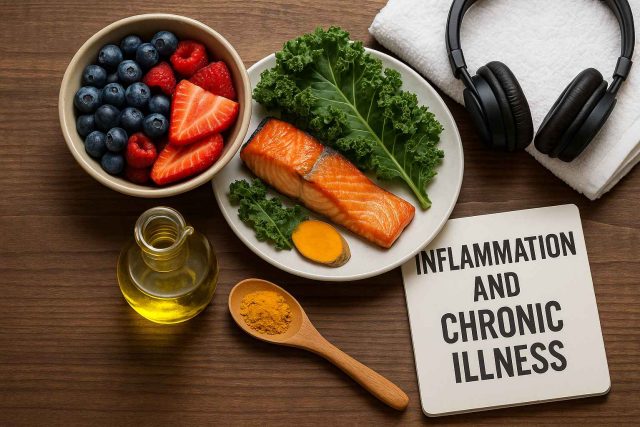What if small lifestyle tweaks could help dial down the fire of chronic illness? That’s the promise behind the rising buzz around inflammation and chronic illness—a health connection that’s finally getting mainstream attention. Whether you’re managing lupus, IBD, fibromyalgia, or another long-term condition, new research and real-life stories show that daily habits play a key role in managing inflammation. Let’s explore how the latest wellness trends can empower your healing journey.
Table of Contents
- What Is Chronic Inflammation?
- How Lifestyle Impacts Inflammation
- Accessible Anti-Inflammatory Practices
- When to Seek Medical Help
- Conclusion
- FAQs
What Is Chronic Inflammation?
Unlike the swelling that happens when you sprain an ankle, chronic inflammation is a slow, persistent immune response. It’s often invisible but contributes to long-term damage, especially in autoimmune and metabolic diseases. Over time, it can increase pain, fatigue, and organ stress. Conditions like rheumatoid arthritis, Crohn’s disease, and multiple sclerosis all involve some level of systemic inflammation.
Doctors now view chronic inflammation as both a symptom and a trigger of disease progression. That’s why reducing it is key not just for comfort—but for improving long-term outcomes.
How Lifestyle Impacts Inflammation
Here’s the good news: your daily choices can influence your body’s inflammation levels. Studies show that diet, sleep, stress, and physical activity all affect inflammation markers. For instance, foods rich in antioxidants—like berries, leafy greens, and fatty fish—can lower C-reactive protein, a key marker of systemic inflammation.
Chronic stress, poor sleep, and sedentary routines can fuel the inflammatory process. On the other hand, regular gentle movement (like walking or yoga), mindfulness, and sleep hygiene help regulate immune responses. You don’t need to overhaul your life overnight. Even modest changes can create noticeable relief over time.
Accessible Anti-Inflammatory Practices
You don’t need a luxury retreat or expensive supplements to fight inflammation. Many tools are budget-friendly and easy to implement. Here are practical lifestyle shifts that research supports:
1. Build a Colorful Plate
Whole foods with natural colors often carry antioxidant and anti-inflammatory properties. Include dark greens, berries, turmeric, ginger, flaxseeds, and omega-3 sources like walnuts or salmon.
2. Prioritize Restorative Sleep
Aim for 7–9 hours of sleep. Use tools like white noise, blackout curtains, or consistent routines to encourage better rest.
3. Move Daily (Gently)
Movement reduces inflammation, even if it’s low-impact. Try swimming, stretching, or tai chi—whatever fits your energy levels.
4. Manage Stress Proactively
Meditation, journaling, therapy, or spending time in nature can reduce cortisol, a stress hormone tied to inflammation. Short daily practices matter more than rare deep dives.
For more resources on holistic wellness, visit Healthcare.pro.
When to Seek Medical Help
While lifestyle changes are powerful, they’re not a substitute for medical treatment. If symptoms flare or you’re unsure which changes are safe, consult a healthcare provider. This is especially critical if you’re on medications that could interact with herbs or supplements. Your doctor or specialist can guide a tailored anti-inflammatory plan that works with your condition—not against it.
For chronic condition support and community resources, HealingWell is your ally. If you’re considering digital tools to support patient education or provider outreach, eHealthcare Solutions also offers integrated solutions for health brands.
Conclusion
Inflammation may be invisible, but its effects are real—and so is your power to fight it. By choosing nourishing foods, getting quality rest, staying active, and addressing stress, you can lower chronic inflammation and support your body’s healing process. Even small shifts can offer big relief. And remember, you’re not alone—support and science are here to back you up.
FAQs
What are the symptoms of chronic inflammation?
Common signs include fatigue, joint pain, digestive issues, brain fog, and frequent infections. Symptoms vary depending on the condition.
Can diet alone reduce inflammation?
Diet is a key tool, but it works best alongside stress management, sleep, and movement. A holistic approach offers the best results.
Is inflammation always bad?
No. Acute inflammation is a natural healing response. It only becomes problematic when it persists without an injury or infection.
Do supplements help with chronic inflammation?
Some supplements like omega-3s, turmeric, or probiotics may help, but always consult a doctor before starting any new regimen.
How do I know if my inflammation is under control?
Track your symptoms and lab results like CRP with your doctor. Improvements in pain, energy, and digestion are good signs of progress.
This content is not medical advice. For any health issues, always consult a healthcare professional. In an emergency, call 911 or your local emergency services.




